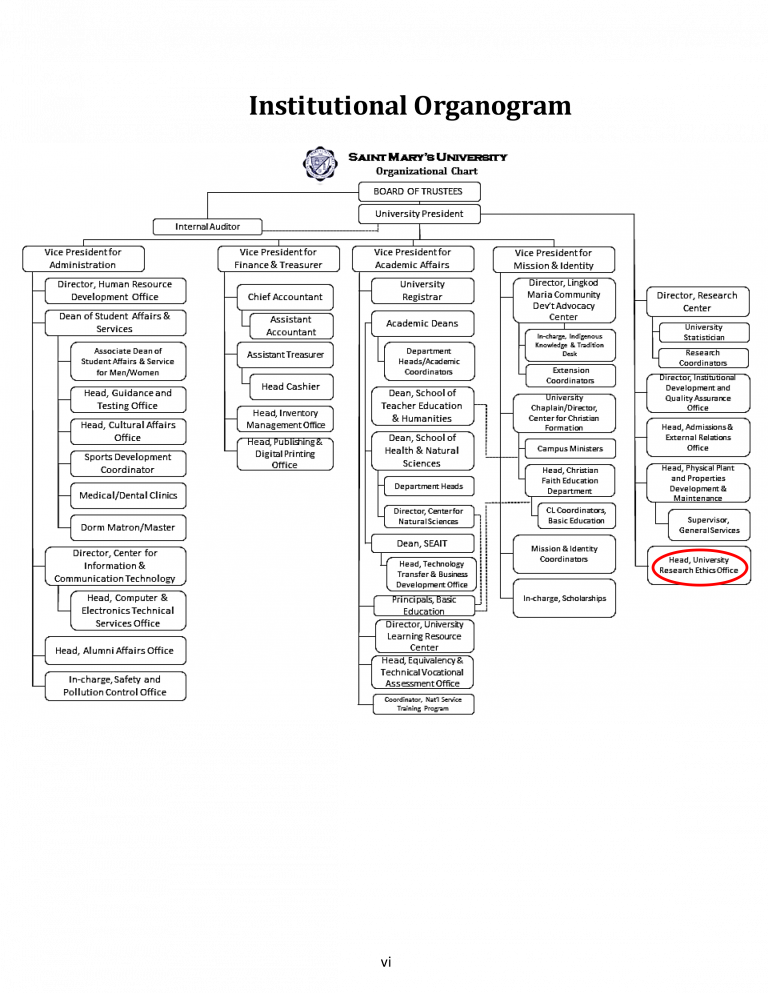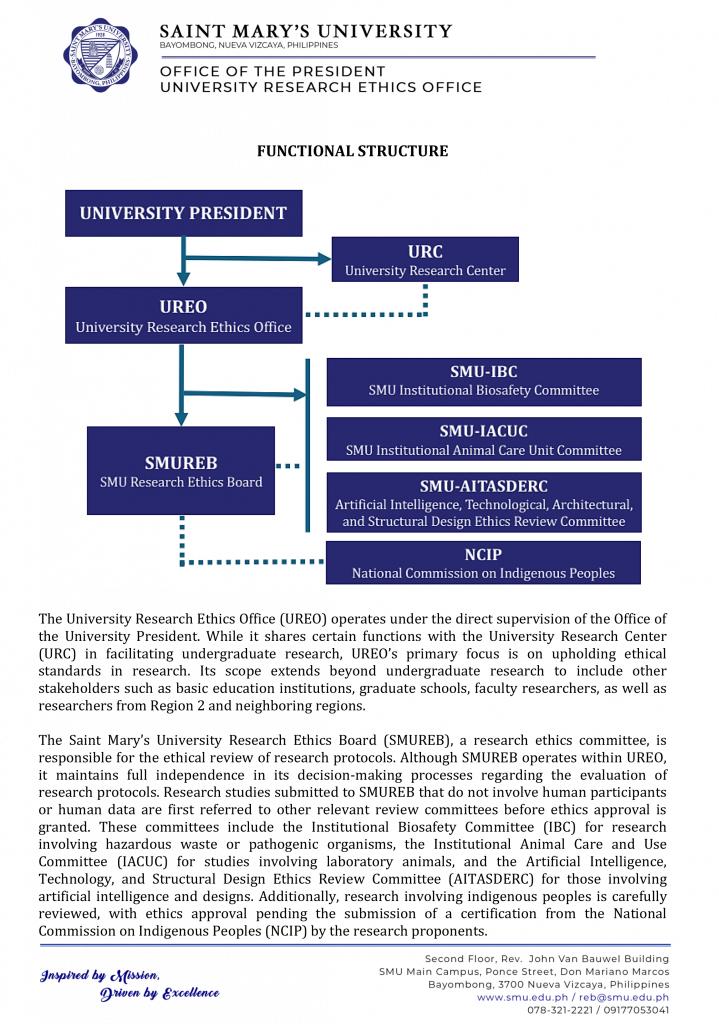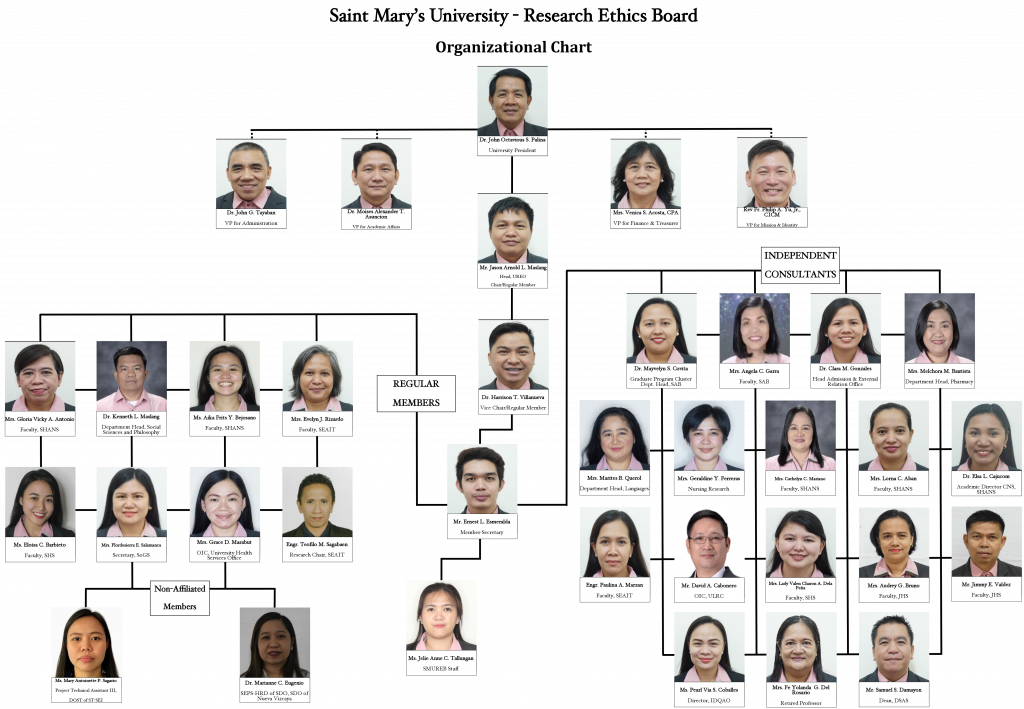University Research Ethics Office
VISION
SMUREB envisions becoming a leading committee that champions the advancement of research by fostering the highest standards of scientific integrity and ethical accountability among SMU students, faculty, and researchers from other institutions.
MISSION
SMUREB is dedicated to safeguarding the well-being of human participants in research by ensuring that all research proposals submitted for review adhere to national and international standards of ethical research.
In relation to the vision-mission of Saint Mary’s University, SMUREB is established as an institutional research ethics review committee to ensure that the research of students and faculty adhere to national and international guidelines as part of the integral formation of persons exemplifying excellence and innovation. The review process guarantees that research is ethically sound with scientific merit and social value. The committee looks forward to catering to other researchers in the region as a conscious effort to strengthen communion with other research institutions.
DESCRIPTION/HISTORY
Ethical research has always been part of Saint Mary’s University’s quest for scientific soundness and validity. This is premised on the belief that an ethics review protects both the researcher and the research participants. Pockets of training and seminar workshops have been conducted in the institution for the past years. However, an office and a manual of operations, procedures, and guidelines were non-existent. The former director, Dr. Fe Yolanda G. Del Rosario, initiated earlier efforts along this line. In 2015, she sent faculty members to attend ethics review training and even sponsored institutional seminar training throughout the years. In 2017, the idea of establishing the Ethics Review Committee (REC) was introduced to the Research and Community Development Council (RCDC). Still, it was tabled to give way to other equally important matters at the time.
This was also recognized by the former director of the Indigenous Knowledge and Tradition (IKAT) Center, Dr. Darwin Don M. Dacles, in 2017, and later, as the Director of the Lingkod Maria Community Development and Advocacy Center (LMCDAC) in 2018. This was the reason why the Center proceeded to establish linkage through a Memorandum of Understanding (MOU) with the Regional and Local National Commission on Indigenous Peoples’ (NCIP) offices by virtue of Administrative Order (AO) #1, s. 2012, calling for the Informed Consent and Participation of the indigenous peoples (IPs) in research undertaking and documentation of their Indigenous Knowledge, Systems, and Practices (IKSPs). The partnership was meant not only to fast-track research undertakings but also to widen the roles and duties of culture bearers and masters and their people in protecting their safety, rights, and well-being and to promote ethically sound research. Consequently, the same idea was echoed inasmuch as the MOU may not be sufficient since what is required is the creation of a Research Ethics Committee.
In 2019, accreditation results called for establishing an Ethics Review Committee and its policies and procedures. With the appointment of Dr. John Octavious S. Palina, the first layman university president in the same year, a direct order for the University Research Center, now headed by Dr. Darwin Don M. Dacles, pushes for the creation of the University Research Ethics Board (UREB). Its creation was due to the following reasons: (a) the demand of the times (a must for all sectors conducting research and documentary works that, directly and indirectly, affect the well-being of human participants, communities, including the environment); (b) exigency of need (the proliferation of researches and documentary works with sheer disregard on the well-being of human participants, communities, including the environment); and (c) legal constraints accompanying failure of researchers, institutions and organizations to follow provisions (which came at a point when data privacy was enacted, when the NCIP called for stronger protection of IP rights and IKSPs and others like experimentations on humans, plants, animals, etc.).
The approval by the president was articulated in a transmittal letter dated Oct. 1, 2020, establishing the UREB with seven original members. On October 5, 2020, the Policy Statement was presented to the RCDC for deliberation and was finally signed by the Chair of the RCDC and the endorsing unit (URC). The policy stipulated that the UREB is independent in matters of decision-making relative to ethical research and reviews. Further, in carrying out the UREB vision-mission and goals, the university shall appropriate needed funds and administrative support thereof, namely: (a) establishment of an office; (b) appointment of
administrative support staff; and (c) appropriating honoraria fees for its reviewers. Subsequently, the University Research Center issued memorandum number 1, s 2021 on August 5, 2021, directing all academic research, community-initiated and solicited study, research in aid of policy, and socio-cultural research in the university shall undergo ethics review by the UREB.
In November 2020, upon confirmation by the Board of Trustees, the University President, after due consultation with the members of the Advisory Board, appointed Mr. Jason Arnold L. Maslang to head the UREB. On January 12-13, 2021, departmental and institutional members of the UREB attended the Basic Research Ethics Training (BRET) sponsored by the DOST – Philippine Health Research Ethics Board (PHREB). The second training was conducted for another group of primary reviewers on April 25, 2021. Since then, the roster of primary and alternate reviewers has increased.
On August 28, 2021, an awareness-building webinar on Research Ethics Review Clearance (for Graduate School students) was conducted. On October 13, 2021, another orientation webinar on Research Ethics Clearance (for Undergraduate Students) was also done. On March 11, 2022, a re-orientation webinar for all reviewers, adviser-promoters, research chairs, and research instructors was conducted to widen the base of co-ownership of the UREB vision-mission, goals, and strategic activities.
With the tentative UREB MOPG in October 2021, a dry run for ethics review for Graduate School students’ protocol documents started in the last quarter of 2021. As soon as the finalized MOPG and forms were completed during the second semester of 2021-2022, the UREB formally started receiving protocol documents for review for both Graduate School and Undergraduate students. The launching of the UREB Manual and Blessing of the Office was conducted on April 25, 2022.
Indeed, for everything, there is a season. A time for every activity under heaven. A time to plant and a time to harvest (Ecclesiastes 3:1-8). A long-cherished dream of the institution has come true indeed.
For historical reference, the following were the pioneering members:
Regular Members (Now re-classified as Members)
1. Jason Arnold L. Maslang (Chair)
2. Atty. Marie Joy P. Salgado (Vice Chair)
3. Harrison T. Villanueva, Ph.D. (Secretary)
4. Rev. Fr. Philip A. Yu
5. Arlene L. Tabaquero, Ph.D.
6. Clara M. Gonzales, Ph.D.
7. Ivy N. Lopez
8. Albert Garcia (Non-Affiliated Member)
Alternate Members (Now re-classified as Independent Consultants)
1. Henry F. Gamboa, Ph.D.
2. Mayvelyn S. Covita, Ph.D.
3. Pearl Via S. Coballes
4. Peter-Tom A. Callang
5. Mark C. Balonquita
6. Engr. Carina S. Mallillin
7. Engr. Jefrie T. Alindayu
8. Darwin Don M. Dacles, Ph.D.
9. Cesar T. Medula, Jr., Ph.D.
10. Gloria Vicky A. Antonio
11. Melencio G. Bernardino, Jr.
12. Engr. Andres P. Gualon, Jr.
13. Aireen O. Santos
14. Regina D. Ramel, Ph.D.
15. Elnora Adalem, CPA
16. Moises Alexander T. Asuncion, Ph.D
17. John G. Tayaban, Ph.D
18. John Octavious S. Palina, Ph.D
19. Fe Yolanda Del Rosario, Ph.D
20. Rev. Fr. Alberto I. Tamisen, CICM
As the SMUREB started its operation in September of 2021, the membership had been revised due to the movement of some members out of the University. At the start of the academic year 2022-2023, memberships of academic deans and directors were no longer renewed.
On August 1, 2022, the UREO (University Research Ethics Office) was established as a junior administrative unit with a dedicated office staff. The functions and responsibilities of the UREO head include (1) capacitation of faculty and students to become ethical researchers; (2) development of ethics guidance and processes for incorporation into the policies/guidelines of the University Research Center and the School of Graduate Studies; (3) ensuring that the culture of research ethics is sustainable and fully imbibed by the Marian community, and; (4) serving as chair of the institutional research ethics committee (SMUREB). The SMUREB is independent in its decision-making, and while it is allied to the University Research Center, it is directly under the office of the University President. The SMUREB is housed in the UREO, along with the other institutional ethics review committees, namely the SMU-IACUC (Institutional Animal Care and Use Committee), SMU-IBC (Institutional Biosafety Committee), and AITASDERC (Artificial Intelligence, Technological, Architectural, Structural Design Ethics Review Committee).
This SOP defines all the operations of SMUREB. More importantly, it allows the SMUREB to stand as an independent unit in the University whose decisions on ethics review cannot be influenced by other entities because of the policy-based mechanisms defined in this book of SOPs. However, these SOPs are dynamic and can be amended and modified according to time demands. The procedures for amending this SOP are also embedded within this book of SOPs. Moreover, the membership of SMUREB is also dynamic. There are procedures for a smooth membership transition when selecting and appointing new members in case of outgoing members.
Links:
- Accreditation certificate
- Standard Operating Procedures
SOP 01
SOP 02 - UREO Guidelines
REO-GL-001
REO-GL-005
REO-GL-006 - Downloadable Forms and Templates
Contact Details:
Second Floor, Fr. John Van Bauwel Building
SMU Main Campus,
Ponce Street,
Don Mariano Marcos Bayombong,
3700 Nueva Vizcaya, Philippines
www.smu.edu.ph | reb@smu.edu.ph (078) 321-2221 ǀ 09177053041



